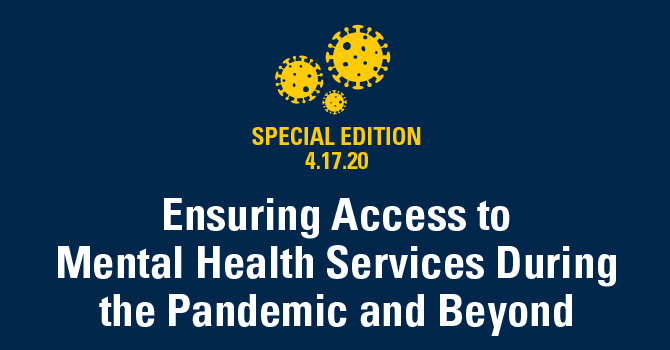Ensuring Access to Mental Health Services During the Pandemic and Beyond

The coronavirus pandemic has turned our lives upside-down. The uncertainty of a global crisis—layered with the challenges of job losses, school closures, lifestyle changes, and social isolation—can generate stress, anxiety, and depression. And for those who previously relied on face-to-face contact with therapists or support groups to cope with mental health issues or substance use disorders, this situation presents an additional challenge.
Since the beginning of this crisis, there has been significant focus on ensuring hospitals have enough health care workers to manage a huge surge in patients with COVID-19. Angela Beck, a clinical assistant professor of Health Behavior and Health Education at the University of Michigan School of Public Health, explains why it’s also important to evaluate the capacity of the mental health workforce to respond to an equally inevitable spike in people struggling with mental and behavioral health issues during this pandemic and into the future.
|
Subscribe and listen to Population Healthy on Apple Podcasts, Spotify, Google Podcasts, iHeartRadio, YouTube or wherever you listen to podcasts! Be sure to follow us at @umichsph on Twitter, Instagram, and Facebook, so you can share your perspectives on the issues we discussed, learn more from Michigan Public Health experts, and share episodes of the podcast with your friends on social media. |
Speaker 1: Almost overnight the coronavirus pandemic has turned our lives upside down. Millions of Americans have lost their jobs. Many of those who are still employed have had to quickly transition to working from home, sometimes while also taking care of and attempting to homeschool their children. Others are frontline workers providing health care and other essential services while putting their own health at risk every day. On top of all that, the uncertainty of a global crisis layered with the challenges of physical distancing and feelings of isolation can generate stress, anxiety, and depression. No matter your circumstances, this pandemic can take a toll on mental health. And for those who previously relied on face-to-face contact with therapists or support groups to cope with mental health issues or substance use disorders, this situation presents an additional challenge.
While there has been a lot of discussion about making sure we have enough doctors, nurses, respiratory therapists, and other clinicians to manage a huge spike in patients with COVID-19, what about the capacity for the mental health and behavioral health workforce to respond to an equally inevitable spike in patients and clients and a need to deliver services in a different way?
Hello and welcome to Population Healthy, a podcast from the University of Michigan School of Public Health. This episode is part of a series of special editions of our podcast, focusing on the ongoing coronavirus pandemic. To learn more about the impact of this pandemic and mental and behavioral health providers, we talked with Angela Beck, a clinical assistant professor in the Department of Health Behavior and Health Education at the University of Michigan School of Public Health and the principal investigator and director of the Behavioral Health Workforce Research Center.
Beck: As policy-makers across the country consider options for flexing and surging the frontline healthcare workforce, these same considerations should be applied to the behavioral health workforce. Not only is their concern about maintaining service delivery throughout the crisis, but we know that mental health needs tend to spike after a crisis resolves. So the time for prevention really is now.
Speaker 1: Professor Beck shared three important ways policy-makers can strengthen the mental and behavioral health workforce and help ensure capacity and access during this crisis and beyond.
Beck: First, to support flexing and surging of the mental health and substance use disorder workforce, licensing regulations across states should be reconsidered and modernized to strengthen workforce capacity without compromising quality of care. Each state has authority over the licensing regulations for its health professions. This means that educational and training requirements, license renewal requirements, and the portability of that license across state lines can vary state by state for the very same profession. Also, part of state licensing regulations is what's called ‘scope of practice’ and that’s defined as the activities that an individual healthcare practitioner is permitted to perform within a specific profession. And again, those elements of ‘scopes of practice’ for the very same profession can vary by state. In some states, scope of practice artificially limits the practice authority of health professionals. Meaning providers are educated and trained to perform at a higher level than what the state law will permit. So right now, we're in a time of potential workforce shortfall coupled with a global public health emergency, so all states should be reviewing those licensing regulations to ensure that all professions are permitted full practice authority.
There's currently inconsistently across states as to which type of behavioral health professionals are explicitly permitted to engage in diagnosis, psychotherapy, assessment, treatment and counseling. Utilizing our existing workforce to its full capacity is really key right now.
In addition, waivers on licensure renewal requirements and the granting of temporary licensure to those close to completion of their requirements should be a priority. This can be an effective mechanism for surging the workforce. The City of New York, put out a call for retirees to volunteer to help fight the COVID-19 pandemic and received response from thousands of healthcare providers who are granted licensure within days. So flexing these regulatory requirements can be really effective for enhancing workforce capacity.
The second area of consideration involves reimbursement and payment for services. Payment mechanisms for services need to keep up with the changes in provider scope and where the care is taking place. The Centers for Medicare and Medicaid Services is a federal agency that administers the nation's major healthcare programs including Medicare, Medicaid, and the Children's Health Insurance Program.
CMS has broad authority over provider reimbursement rules for those programs and has already issued blanket waivers to loosen federal requirements and restrictions around provider enrollment and the types of sites where care can take place.
States can request additional supplemental waivers to CMS to help flex and surge their workforce. The State of Washington recently submitted a combination of waiver requests that support worker flexibility and safety, both for patients and for caregivers. The requests also aim to leverage existing state infrastructure to support efforts to integrate primary care and behavioral health services. So these types of waivers offer an opportunity for states to be innovative in their service delivery.
Reimbursement rules can aid in flexing and surging the workforce, they can also limit capacity of the behavioral health workforce. For example, mental health counselors and marriage and family therapists, despite being masters trained licensed professionals, remain ineligible for Medicare reimbursement. So this creates a barrier to maximizing use of this essential component of the workforce during a time of really high need right now.
And the third area I would mention is the focus on telehealth. Federal partnership is needed to maximize the use of behavioral telehealth. In the last few weeks we've seen federal agencies temporarily loosen requirements around how telehealth can be used by providers for substance use disorder treatment. This is a good step, but more can be done.
The recent COVID-19 legislation aimed to better support mental health services and expand telehealth, but it did not designate federally qualified health centers and rural health centers, as locations for telehealth that can be reimbursed by Medicare. This is something that should be addressed in future legislation as these sites serve some of our nations most vulnerable population. So as states are reviewing licensure regulations, they should look specifically at provider authorization to use telehealth. Currently, all states grant specific authority to physicians to provide telehealth services but for other professions, that authority is not explicitly defined in all of the states when it comes to mental health and substance use disorder. This is a potential problem because even if the federal regulations are modified to support use of and payment for behavioral telehealth, providers may be reluctant to do this if they're unsure whether they actually have state granted authority to do so. And again, the ability of providers to work across state lines becomes increasingly important when we're thinking about telehealth.
So those are the main areas that I think of for the mental health workforce where we have policy levers available to help flex and surge that workforce capacity. I think there's great opportunity to learn right now. Sometimes the system innovates out of necessity in times of emergency. As has been noted by others the COVID-19 pandemic has exposed the deep cracks in the foundation of our healthcare system that have always existed and has exacerbated them.
The same is likely to be true for the mental health system. In this time of crisis, and uncertainty, there's opportunity to mend some of those cracks with regulatory changes. We might find that some of these shifts should not be temporary, but could actually advance our national efforts longer term to provide more equitable and effective healthcare to all who need it.
Speaker 1: This has been a special edition of Population Healthy, a podcast from the University of Michigan School of Public Health. During the ongoing coronavirus pandemic, we’ll work to bring you analysis from our community of experts to help you understand what this public health crisis means for you. To stay up-to-date in between special edition episodes, be sure to check out our website publichealth.umich.edu, subscribe to our Population Healthy newsletter at publichealth.umich.edu/news/newsletter and follow us on Twitter, Instagram, and Facebook @umichsph.
In This Episode
 Angela Beck
Angela Beck
Clinical Assistant Professor of Health Behavior and Health Education
Angela Beck is a clinical assistant professor of Health Behavior and Health Education and director of the Behavioral Health Workforce Research Center at the University of Michigan School of Public Health. Her research interests include organizational performance of public health departments, workforce development, health workforce planning, and delivery of mental health and substance use disorder services to vulnerable and underserved populations. She is currently exploring emergency workforce policy options to support health workforce surge capacity during the coronavirus pandemic.
